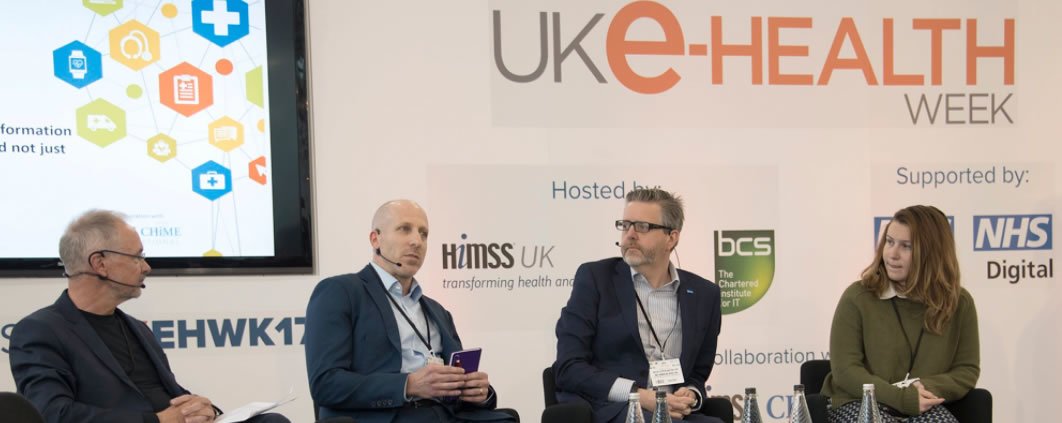I just thought I’d share my thoughts on the UK eHealth Week event that I attended. There seemed to be a good turn-out at the event and I got the opportunity to listen to some excellent speakers. They shared their views on digital health and how the NHS’ ‘Global Digital Exemplars’ (GDEs) are using new technology to create a positive digital experience for patients and improve healthcare outcomes.
In terms of some of key themes that were being addressed, I picked up on the following broad discussion areas:
- Involve the patient in the solution design
- Data security
- Interoperability & sustainability
- Collaboration with innovative SMEs
- Skills & strong leadership
Involve the patient in the solution design
I listened to a number of talks in Theatre 2 which was the NHS Digital: Nursing stream and it was great to hear the likes of Deborah El-Sayed (Director of Digital & Multi Channel Development for NHS England) , Dr Victoria Betton (mHabitat) and Rafael Sorribas (NHS Digital) all mention that successful digital health assets all have one thing in common – they’ve been built with significant input from the HCPs and patients that are going to be using them. Victoria Betton provided some great examples of how digital tech was being used to improve communication between HCPs and young people, and signposted her audience to an Ofcom report titled: Children and parents: media use and attitudes report 2016
We also heard from the inspirational Molly Watts, who suffers from dual sensory impairment and she delivered a great presentation on how health tech and in particular smart hearing aid technology has improved the quality of her life.
Rafael Sorribas, gave a detailed account of how the NHS are trying to tackle ‘digital disruption’ and why it’s important to “integrate around the patient” when designing a digital health ecosystem. Along with Rachel Murphy they also spoke about the new NHS Choices; the Beta version of the new Health Apps Library and how the NHS are now looking at collecting more clinical evidence surrounding the performance of various health apps listed.
Cyber-security and data protection
As you can imagine there was a lot of debate around the challenges of securing patient and clinical data and whether or not ‘The Cloud’ was a safe place to be for the NHS. @CLARUSecure posted: The private nature of health data means #healthcare organisations find it hard to benefit from #cloud storage & processing resources #EHWK17
It was amusing to see that the Security & Counter Terror Expo was also taking place at Olympia on the same 2 days. In fact one guy tweeted: Last time I was at London Olympia it was old job – counter terror expo. This time #EHWK17 health digital. Common theme is #CyberSecurity!
With patient health data being worth ten times more than your credit card data on the black market it’s one area the NHS can’t afford to get wrong. Joost Bruggeman from Siilo even touched upon the dangers of using WhatsApp on the unplugged stage.
Interoperability & sustainability
Another topic that drew a lot of interest and generated much debate was around interoperability and building sustainable digital platforms. Once of the main IT challenges that the NHS faces is that many Trusts use legacy IT systems that have not been built using Open Source software. The absence of standards that mandate interoperability between digital health solutions and devices impedes innovation and economies of scale. This also prevents the NHS’ investments in technology from being well utilised and limits the scalability and sustainability of such solutions. It was great to hear one GDE talk about what ‘digital transformation and maturity’ looks like for them and how they are leading the way in using open source software and creating patient focused digital platforms like MyHealthLocker
Collaboration with innovative SMEs
Being a small business owner I was delighted to see a good number of small businesses showing off their health tech at the show and to also hear how some Trusts are making it easier for innovative micro businesses to do business with them. Kate Warriner (Healthy Liverpool Digital Lead) from the Liverpool CCG stated “we’ve actively engaged with local SME digital agencies to help implement our digital transformation plan”. She talked in detail about the digital assets they’ve had developed, such as their E Sepsis system and the audience particularly enjoyed the highly entertaining Healthy Liverpool Programme video.
Skills & strong leadership
As we know change doesn’t happen easily without strong leadership and a well delivered training programme to help up-skill staff and end-users.
It was great to hear Steven Roberts, Strategic Transformation Director and Vice Chair at Barclays UK close the show. As we know there are many similarities between the financial services and healthcare sectors, namely they are both highly regulated and they handle a lot of highly sensitive customer data. He spoke about how their Eagle Labs are an example of how technology can be used to benefit service users and how they are helping their customers and colleagues with the move to ‘digital’.
My closing thoughts
In recent years, health tech has evolved significantly. Without doubt users are increasingly relying on a multitude of health tech to help manage physical and mental conditions, prevent disease and share information with doctors and consultants. There is still a long way to go for the NHS and there are some complex challenges that still lie ahead in respect of security, interoperability and measuring health app quality but I came away from the event feeling more confident. I saw tangible evidence that real progress was being made by the NHS in adopting health tech especially by the GDEs and hopefully they’ll be able to create a digital roadmap for other Trusts to follow. And for a small digital healthcare agency like us, it was great to hear how the NHS is engaging with the SME community and making the procurement process more small business friendly. This is a real positive for small specialist agencies like ourselves as it gives us the confidence to keep on investing in digital health R&D and training – because we can clearly see that there is real commercial demand for our skills, services and products from healthcare organisations like the NHS who want expert help with their digital transformation.
Thanks for reading, @DamonL
BTW – Why not download our latest white paper – How mHealth is improving health & social care



